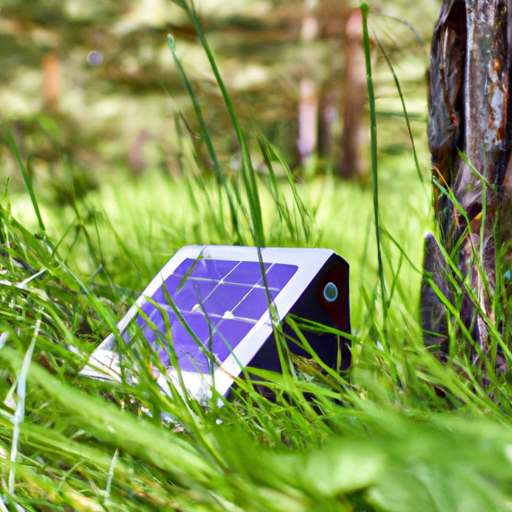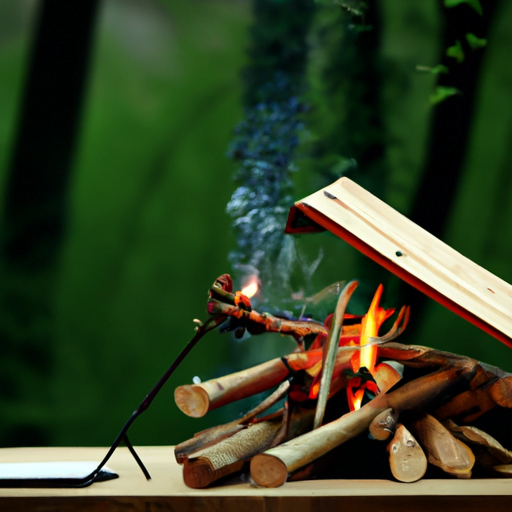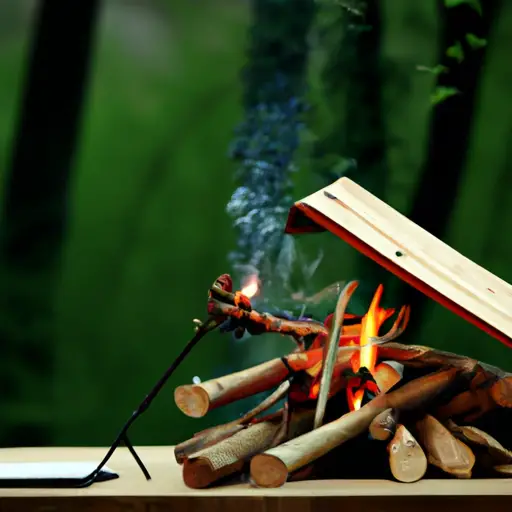Have you ever wondered what it would be like to live off the grid? To disconnect from the constant buzz of notifications, emails, and social media updates? It may seem like a daunting prospect, but the art of off grid living offers a unique opportunity to simplify your life and reconnect with nature. In this article, we will explore the various ways you can survive without the internet and embrace a more self-sufficient lifestyle.
Living off the grid means relying on yourself for basic necessities such as food, water, and energy. It involves disconnecting from the traditional power grid, relying instead on alternative sources of energy like solar power or wind turbines. By learning to generate your own electricity, you can reduce your carbon footprint and become more self-reliant. Whether it’s installing solar panels on your roof or using a small generator for backup power, there are plenty of options available to power your off grid home.
Surviving without the internet may seem like a daunting task in our digital age, but it is entirely possible. Off grid living is all about embracing a simpler, more self-sufficient lifestyle. Without the constant distractions of the online world, you can focus on activities that truly matter to you. Whether it’s gardening, woodworking, or spending quality time with loved ones, off grid living allows you to prioritize what is truly important in life.
In the following sections, we will delve deeper into the various aspects of off grid living and provide you with practical tips and advice on how to survive without the internet. From growing your own food to implementing sustainable water and waste management systems, you will learn how to create a self-sufficient oasis in the midst of a digital world. So, if you’re ready to embark on a journey towards simplicity and sustainability, read on to discover the art of off grid living.

Introduction
Welcome to the art of off grid living, where you will learn how to survive and thrive without the internet. In today’s digital age, the internet has become an integral part of our lives. From communication to information access, it seems impossible to imagine a world without it. However, there is a growing movement of individuals and families who have chosen to disconnect from the online world and embrace the simplicity and self-sufficiency of off grid living. In this article, we will explore what off grid living entails, the benefits and challenges it presents, and provide you with practical tips on how to navigate this unique lifestyle.
Understanding Off Grid Living
Defining Off Grid Living
Off grid living is a lifestyle choice that involves living without access to public utilities such as electricity, water, and gas. It requires individuals to generate their own power through alternative energy sources such as solar panels or wind turbines, collect rainwater for personal use, and rely on natural gas or wood for heating and cooking. Essentially, off grid living means being self-sufficient and disconnected from the infrastructure and convenience of modern society.
Benefits of Off Grid Living
Living off the grid offers a multitude of benefits. Firstly, it allows individuals to reduce their carbon footprint by utilizing renewable energy sources and minimizing waste generation. Additionally, off grid living provides a greater sense of independence and self-reliance as individuals must learn to meet their basic needs without relying on external sources. Moreover, this lifestyle promotes a deeper connection with nature and a simpler way of life, fostering a sense of peace and tranquility.
Challenges of Off Grid Living
While off grid living can be an incredibly rewarding experience, it also poses its fair share of challenges. One of the main challenges is the initial cost of setting up an off grid home. The procurement of land and property, as well as the installation of alternative energy systems, can be quite expensive. Additionally, unpredictable weather conditions can impact the reliability and efficiency of alternative energy sources. Lastly, living off the grid requires a significant adjustment in daily routines and habits, as individuals must be mindful of their energy and water consumption.
Preparing for Off Grid Living
Assessing Your Needs and Goals
Before embarking on the off grid living journey, it is essential to assess your needs and goals. Determine what amenities and resources are necessary for your lifestyle and evaluate your ability to adapt to a simpler way of life. Consider your power consumption, water requirements, and comfort levels in order to make informed decisions when choosing the right location and designing your off grid home.
Choosing the Right Location
Selecting the right location is crucial for successful off grid living. Look for areas with ample sunshine and wind availability if you plan on harnessing solar or wind power. Access to a clean water source, such as a natural spring or a nearby river, is also important. Moreover, take into account the proximity to necessary amenities like hospitals, grocery stores, and schools to ensure convenience while maintaining your off grid lifestyle.
Acquiring Land and Property
Once you have identified your ideal location, the next step is acquiring land and property. Research local regulations and zoning restrictions to ensure your off grid lifestyle is legally feasible. Seek out real estate options that align with your goals, focusing on properties with suitable terrain for energy generation and self-sustainability. Additionally, consider factors such as available resources, accessibility, and potential for expansion if needed.

Building an Off Grid Home
Designing a Sustainable Home
When designing your off grid home, it is essential to prioritize sustainability and energy efficiency. Incorporate passive design principles, such as orienting your home to maximize natural light and ventilation, minimizing the need for artificial lighting and air conditioning. Use sustainable building materials such as reclaimed wood, recycled insulation, and low VOC paints to minimize the environmental impact of your construction. Additionally, plan for ample insulation to ensure optimal temperature control and energy efficiency.
Alternative Energy Sources
With no access to public utilities, alternative energy sources are essential for off grid living. Solar panels and wind turbines are popular choices for generating electricity. These renewable energy sources harness the power of the sun and wind, providing clean energy for your off grid home. Invest in high-quality and efficient systems to ensure a reliable power supply throughout the year.
Water and Waste Management
Off grid living requires careful management of water resources. Implement rainwater harvesting systems to collect and store rainfall for various purposes such as irrigation and household needs. Install efficient water fixtures, such as low-flow toilets and water-saving showerheads, to minimize water consumption. For waste management, consider composting toilets and greywater systems to reduce water usage and create nutrient-rich fertilizers for your garden.
Securing Basic Necessities
Food and Water Storage Solutions
As an off grid dweller, it is crucial to have a reliable food storage solution. Stock up on non-perishable food items that have a long shelf life, such as canned goods, dried fruits, and grains. Invest in a chest freezer powered by your alternative energy system to store perishable food items. Additionally, consider preserving food through methods such as canning, dehydrating, and fermenting to extend their shelf life.
For water storage, invest in large capacity water tanks or barrels to store rainwater or other water sources. Ensure proper filtration and purification systems are in place to guarantee clean and safe drinking water.
Growing Your Own Food
One of the significant advantages of off grid living is the ability to grow your own food. Establish a vegetable garden and fruit orchard to supplement your dietary needs. Practice organic gardening methods and cultivate a diverse range of crops to ensure a well-balanced nutritional intake. Consider incorporating vertical gardening systems and raised beds to maximize space efficiency, especially if your land is limited.
Obtaining Clean Drinking Water
Access to clean drinking water is a top priority for off grid living. Invest in high-quality water filtration and purification systems to ensure the removal of harmful contaminants. Depending on your water source, you may need to utilize multiple filtration methods such as sediment filters, activated carbon filters, and ultraviolet (UV) sterilizers. Regularly test and monitor your water quality to ensure its safety for consumption.
Navigating Communication Challenges
Developing Alternative Communication Strategies
Living off the grid often means limited or no access to traditional communication methods such as landline telephones or cellular networks. Therefore, it is important to develop alternative communication strategies to stay connected with the outside world. Consider investing in satellite communication devices or satellite phones to maintain communication in case of emergencies or for essential communication needs.
Using Two-Way Radios or Walkie-Talkies
In the absence of internet and cellular networks, two-way radios or walkie-talkies can provide a reliable means of communication within a limited range. These devices operate on radio frequencies, allowing for instant communication with family members or neighbors. Ensure you understand the local regulations and obtain the necessary licenses required for using these devices.
Exploring Ham Radio Options
Ham radio, also known as Amateur Radio, can be an excellent way to communicate over long distances without relying on traditional telecommunication infrastructure. Ham radio operators use shortwave radio frequencies to communicate with others around the world. Consider obtaining a license and exploring this hobby as a means of long-distance communication.
Maintaining Health and Well-being
Healthy Living Tips
Maintaining good health and well-being is essential for thriving off grid. Pay attention to your diet and ensure you consume a balanced and nutritious meal. Engage in regular exercise and outdoor activities to stay active and physically fit. Prioritize self-care activities such as meditation, yoga, and mindfulness practices to promote mental and emotional well-being.
Alternative Healthcare Solutions
In off grid living, access to healthcare facilities may be limited. Prepare for minor injuries and illnesses by stocking up on a well-equipped first aid kit. Educate yourself on basic medical procedures and techniques, such as wound care and CPR. Additionally, explore alternative healthcare solutions such as herbal remedies, natural healing practices, and essential oils to address common health issues.
Emergency Medical Preparedness
Living off grid means being prepared for emergencies, including medical emergencies. Create a comprehensive emergency medical kit that includes essential medical supplies and medications. Develop an emergency response plan and educate everyone in your household on basic first aid procedures. Consider attending first aid and CPR training courses to enhance your emergency preparedness skills.
Adapting to a Simple Lifestyle
Minimizing Material Possessions
Off grid living encourages a minimalist lifestyle. Embrace the mantra of “less is more” by decluttering and minimizing material possessions. Focus on quality over quantity and invest in durable and long-lasting items that fulfill your needs. Practice conscious consumerism and avoid unnecessary purchases to reduce waste generation.
Embracing DIY Skills
An essential part of off grid living is the ability to be self-sufficient. Learn and develop various DIY skills to fix and maintain your off grid home. From basic plumbing and electrical repairs to carpentry and woodworking, honing these skills will not only save you money but also increase your self-reliance.
Finding Joy in Simplicity
Living off grid offers a unique opportunity to embrace a simpler way of life. Value experiences over material possessions and find joy in the simple pleasures of nature, spending quality time with loved ones, and pursuing hobbies and passions. Disconnecting from the constant distractions of the online world allows you to be fully present and appreciate the beauty of the world around you.
Exploring Off Grid Entertainment
Engaging in Hobbies and Creative Pursuits
Living off grid provides ample time for pursuing hobbies and creative endeavors. Engage in activities such as painting, writing, gardening, or playing a musical instrument. Explore your creative side and discover new talents that bring joy and fulfillment to your off grid lifestyle.
Outdoor Activities and Recreation
Being surrounded by nature opens up a wide range of outdoor activities and recreational opportunities. Take advantage of your natural surroundings and engage in activities like hiking, camping, fishing, or birdwatching. Connect with nature on a deeper level and appreciate its beauty and serenity.
Community Building and Socializing
Off grid living does not mean isolation. Engage with like-minded individuals and build a supportive off grid community. Attend local events, workshops, or gatherings to meet fellow off grid dwellers, share experiences, and foster meaningful connections. Organize potluck dinners, game nights, or other social activities to strengthen your off grid community and create lasting friendships.
Conclusion
Living off the grid and surviving without the internet is indeed an art. It offers an opportunity to reconnect with nature, simplify your life, and embrace self-sufficiency. While off grid living presents its fair share of challenges, with careful planning and determination, it can lead to an incredibly rewarding and fulfilling lifestyle. So, if you are ready to embark on this unique journey, follow the tips and guidance outlined in this article and prepare to thrive in the art of off grid living.




